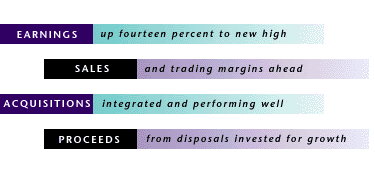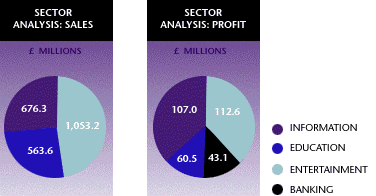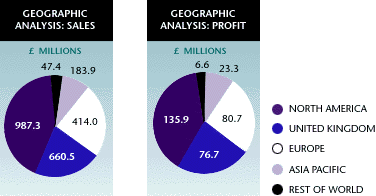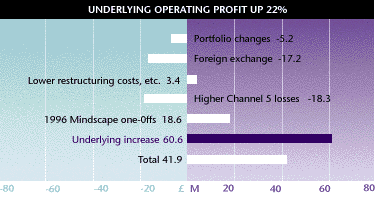




The Business Review

This Business Review analyses the performance of the Group, and each of
our businesses, in the financial year ended 31 December 1997. It also
describes the key considerations in determining financial policy and the
management of risk.
Operating performance
We report the performance of the Group under the three principal headings of Information, Education and Entertainment. Within these categories there have been a few changes in the basis of presentation, and these are described under the relevant headings. Across the Group, we now reallocate central costs to operating companies based on a formula related to sales. This change in presentation brings Pearson into line with best corporate practice and, we believe, provides a truer guide to the underlying performance of each operating company. It also increases the accountability of the Group’s central operations.
| O P E R A T I N G P E R F O R M A N C E | ||
| Numbers in £ millions | 1997 | 1996 |
| Sales | 2,293.1 | 2,186.0 |
| Operating profit | ||
| Information | 107.0 | 88.2 |
| Education | 60.5 | 60.2 |
| Entertainment* | 112.6 | 58.4 |
| Investment Banking | 43.1 | 40.8 |
|
|
|
|
| Continuing | 323.2 | 247.6 |
| Discontinued | - | 33.7 |
|
|
|
|
| Total | 323.2 | 281.3 |
|
|
|
|
| Adjusted earnings per share (p) | 34.9 | 30.6 |
| Operating cash flow | 158.8 | 219.0 |
|
|
|
|
| * Excludes £100m charge for improper accounting at Penguin USA in 1996 | ||
As we have tightened the portfolio of the group over the last two years, focusing on a smaller number of actively managed businesses, the distribution of sales and profits by activity and geography has shifted. The acquisition of the USA adult general fiction publisher, Putnam Berkley, in December 1996 increased Entertainment’s share of total sales from 37% in 1996 to 46% in 1997. This, together with a first full 12 months trading at HarperCollins Educational, means that North America now accounts for 43% of total sales, compared with 37% in 1996.


The table below analyses the various influences on operating profit in 1997. Acquisitions were a significant feature, with a maiden profit contribution estimated at around £24m from Putnam Berkley being the most material single item. The effect of portfolio changes, after taking into account the absence of Westminster Press which was sold at the end of 1996, was broadly neutral.

The Group earns a significant proportion of its sales and operating profits in overseas currencies (in particular the US dollar and the Spanish peseta) and the strength of sterling in 1997 had a negative effect on our published results. If exchange rates had remained at 1996 levels, it is estimated that Group sales would have been higher by £101m and operating profit higher by £17m.
Pearson holds a 24% share in Channel 5, which incurred further start-up losses in 1997, consistent with its business plan. The effect of these losses was almost exactly offset, however, by the absence of one-off charges at Mindscape following restructuring.
Taking into account the factors discussed above, underlying operating profit increased by 22%.
| Top of Page |